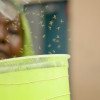Social Insects And How They Communicate
Interview with
Chris - Most people are probably fascinated to see how organised colonies of ants and bees are. How do they actually talk to each other and decide who does what?
William - Well I think this shows that actually ants do have a big intellect. We said earlier that wasps and things can be trained, so insects do have massive brains and they can do all sorts of things. They organise their colonies by a system of chemicals, which they release to each other and keep in touch about what's happening in the colony. For example, if the queen starts to fail, then the workers can pick this up and react accordingly. They don't smell her so much.
Chris - When you say fail, do you mean get old?
William - Yes, they get old and weak, and not able to pump out as many babies for them all. They pick that up and start producing new individuals, and new reproductives.
Chris - So how do ants, say, get told today that they're going to go and get food and come back and tell everyone else where the food is? How is that achieved?
William - Well I think it's a sort of stable system. Let's say to start that they're all feeding. Then if suddenly more food comes, more of them will go and come back, and they'll all get agitated, making even more of them go and get food. So there are very simple rules that they are following; nothing very complicated. If they come back and they're full of food, all the other ants will pick that up and follow them.
Kat - How do they know where to go? You see them marching in a line around the edge of the kitchen. What are they following?
William - It varies, but in ants there's a trail which they leave. Again it's a chemical smell that they smear along the ground and all the ants can follow that and see where they've been.
Kat - Can you rub it to get rid of it?
William - Yes, maybe if you just brush it away, they might not go there. Sometimes the ants just do it individually, by looking at the sun or at landmarks, so they don't need a chemical trail. So if you brushed in that case, it wouldn't make any difference. You'd have to have the right kind of species if you wanted to brush it away.
Chris - I was reading the other day about bees, and they have a pecking order in the hive. Some bees that are in charge of housekeeping duties are confined to barracks, and as they mature, they're allowed to go out and collect things. How's that actually achieved? How do they decide when they've become old enough to get more responsible duties?
William - Well the general idea is that as you get older, if you're a bee, you get to do different things. So you start doing things near the queen, which is where you're maybe born originally and you help the queen. This is certainly true if you're an ant. You help the queen and move eggs, and then as you get older, you move further and further away from the centre of the hive and then eventually, towards the end of your life, you do risky things. It would be a bad idea if you're a young be to go out fighting because you're liable to die. So it's only when you're quite old that you go out and fight. This is opposite to what we do in humans when we send young people out to fight.
Chris - It's not just bees and ants that are social in this way because spiders are too aren't they?
William - Yes there are a lot of social insects. Spiders are only just social. You don't get worker spiders as far as I know that don't reproduce. I think the real test of sociality is is there a group of individuals which are sterile, which do not reproduce. Aphids are like that rather surprisingly. There are some aphids, greenfly, which are permanently sterile and just fight and don't do anything else.
Chris - I know a few people at college from my medical school days who were a bit like that.
William - What, permanently sterile?!
Chris - No, just falling out and fighting all the time.
- Previous The Useful Properties of Honey
- Next The Influenza Survival Kit










Comments
Add a comment